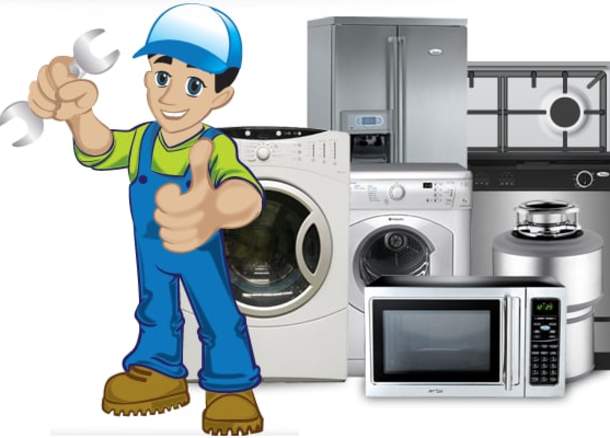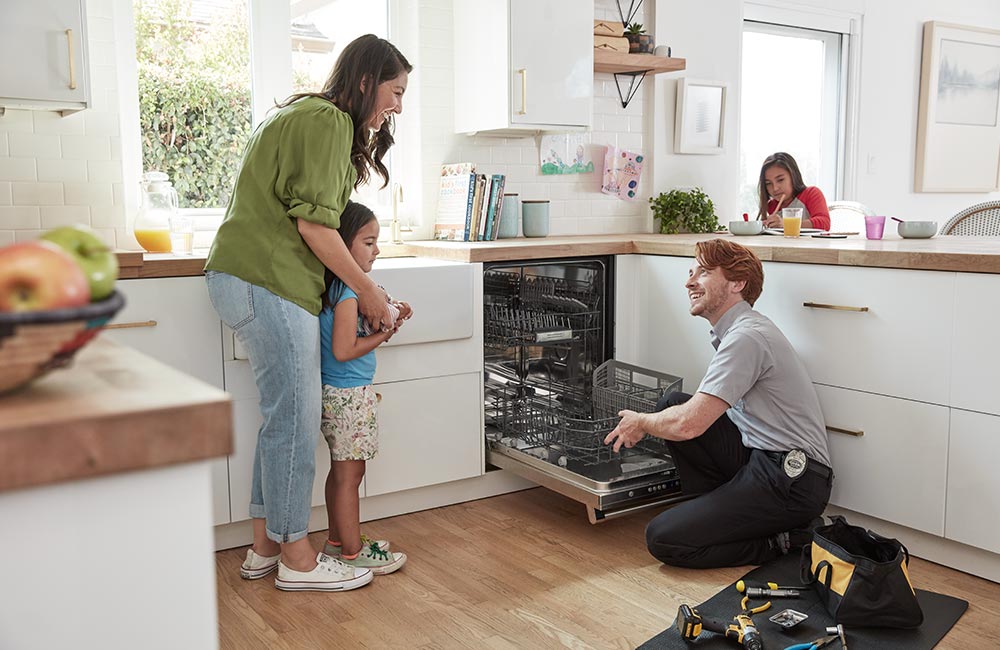Understanding Error Codes – Dependable Refrigeration & Appliance Repair Service Washer repair near me
Understanding Error Codes – Dependable Refrigeration & Appliance Repair Service Washer repair near me
Blog Article
The Ultimate Guide to Understanding Device Repair Service in your home
When your refrigerator quits cooling down or your oven declines to heat, it can feel overwhelming. Recognizing device repair work in the house can conserve you money and time. You'll discover to recognize symptoms, make use of important tools, and adhere to an organized troubleshooting process. But prior to you begin, there are critical safety and security preventative measures you require to consider. What are one of the most common issues, and exactly how can you fix them? Let's discover the essentials.
Usual Home Appliance Issues and Their Signs and symptoms
When your devices begin acting up, it's necessary to acknowledge the indicators early. Disregarding them can bring about bigger problems and costly repair work. If your refrigerator isn't cooling down effectively, you might discover warm areas or condensation forming. This could indicate a falling short compressor or a blocked vent.Your dishwasher might show issues via dirty dishes or unusual sounds throughout cycles. If you listen to grinding or clanking, it's time to investigate.A washing equipment that won't rotate or drain can leave you with soggy laundry, recommending a clogged up drainpipe or a malfunctioning pump.Lastly, if your oven's temperature level seems off or it takes permanently to preheat, you might be dealing with a damaged thermostat. By remaining sharp to these symptoms, you can address issues prior to they escalate right into major repair work.
Essential Tools for Device Fixing
When you're dealing with appliance repairs in the house, having the right tools is vital. Standard hand tools like screwdrivers and pliers will certainly help you disassemble and deal with various devices, while electrical screening tools ensure you're working securely with electrical wiring. Let's go over what you need to start on your repair work trip.
Basic Hand Tools
Having the right tools is necessary for efficient appliance repair service in your home. Start with a reputable screwdriver set, including both flathead and Phillips types, as screws prevail in appliance assembly. Pliers are also important; they aid with gripping, twisting, and cutting wires or little parts. A pair of needle-nose pliers can get to difficult situations quickly. You'll need a good adjustable wrench for tightening up or loosening up nuts and bolts. An energy blade is convenient for reducing through packaging or insulation. Don't fail to remember a durable workbench or surface area to securely arrange your devices and components. With these standard hand tools, you'll be well-prepared to deal with most home appliance repair services that come your way.
Electrical Screening Tools
Alongside fundamental hand tools, electrical testing tools play an essential role in appliance repair work. These devices aid you detect electrical concerns and warranty appliances function safely. A multimeter is crucial; it measures voltage, existing, and resistance, enabling you to pinpoint problems swiftly. A non-contact voltage tester is an additional essential, letting you detect live wires without making direct call, enhancing your safety and security. Secure meters are wonderful for determining current circulation in cords without disconnecting them, saving you effort and time. In addition, circuit testers can rapidly check if outlets are working appropriately. By utilizing these tools, you'll streamline your troubleshooting procedure and boost your repair service skills, making appliance maintenance a whole lot less complicated.
Step-by-Step Overview to Diagnosing Home Appliance Issues
When your device breaks down, it can be frustrating, however identifying the problem doesn't have to be overwhelming. You'll discover to recognize typical troubles and apply efficient fixing techniques. Let's stroll via the actions to obtain your appliance back in functioning order.
Typical Appliance Issues

Troubleshooting Methods Clarified

Fixing Significant Cooking Area Home Appliances: A Closer Look
Have you ever wondered how to take on usual issues with your cooking area home appliances? Fixing major cooking area appliances like fridges, ovens, and dish washers can be less complicated than you believe. Begin by determining the issue-- whether it's a fridge not cooling or an oven that won't heat up. Frequently, a basic reset or inspecting the power resource can address the issue.For refrigerators, clean the condenser coils and check the door seals. If your oven's not heating, examine the home heating component and thermostat. Dishwashing machines could simply require a tidy filter or a reset to obtain them back at work. Always unplug the device before diving into fixings to ensure your safety.Don' t fail to remember to get in touch with the customer guidebook for certain repairing ideas connected to your model. With a little bit of perseverance and the right tools, you can confidently deal with appliance fixings and save cash while doing so!

Fixing Laundry Devices: Tips and Techniques
When your laundry appliances begin acting up, it can really feel frustrating, yet fixing them does not have to be a trouble. Start by inspecting the power supply. Validate the device is plugged in and the outlet is working. Next, inspect the door or lid button; a defective button can avoid the machine from operating.For washers, if it's not spinning, look for unbalanced loads. Rearranging the garments might solve the concern. If your dryer isn't heating, clean the lint filter and examine the air vent for blockages.Listen for uncommon sounds; they can suggest a trouble. If your device is leaking, examine the hose pipes for splits or loosened links. File any type of error codes presented on digital screens, as they can direct you in recognizing the issue. Finally, get in touch with the individual guidebook for specific fixing pointers related to your design.
Security Preventative Measures to Take Throughout Services
Prior to you start any type of device repair work, it's necessary to focus on safety and security to stop crashes or injuries. First, unplug the home appliance or switch off the circuit breaker to guarantee no power reaches it while you work. Use insulated tools to lessen the danger of electrical shock. Use security goggles and gloves to secure on your own from sharp edges or debris (Dependable Refrigeration & Appliance Repair Service Washing Machine Repair).Make specific your work area is clean and well-lit, so you can see what you're doing. Keep kids and pets far from the area to stay clear of diversions and potential dangers. If you're managing gas appliances, be additional careful; look for leakages prior to proceeding.Take your time, and do not hurry via repair work. If you feel unsure concerning any step, it's much better to stop briefly and research study than to presume. Following these preventative measures will assist develop a safer setting for your DIY appliance jenn air repair repair work job
When to Call a Specialist for Help
Just how do you understand if it's time to call a professional for appliance fixings? If you have actually tried basic troubleshooting without success, it's a clear indication. If your home appliance still will not start or reveals uncommon sounds after resetting it, do not hesitate to seek professional help.When you see leakages, smoke, or melting scents, prioritize safety and security and call a professional quickly. These concerns can cause even more substantial damages or present risks to your home.Also, if your appliance is under service warranty, speaking to a specialist is often the ideal path. They can assure that repair work won't invalidate your guarantee, saving you cash in the long run.Finally, if you're unsure or awkward with complicated repairs, it's a good idea to leave it to the specialists. Keep in mind, dealing with complex issues without the right competence can cause expensive mistakes. Trust a professional when unsure!
Often Asked Questions
Just How Can I Avoid Device Troubles in the Future?
To stop device problems in the future, you should execute routine maintenance, check for deterioration, clean filters, and prevent overloading. Remaining proactive will certainly assist expand their lifespan and keep them running efficiently.
What Are the Many Usual DIY Appliance Repair Mistakes?
You could neglect safety and security preventative measures, skip troubleshooting actions, or make use of incorrect devices when attempting do it yourself device repairs. Hurrying the process or disregarding producer standards can lead to even more considerable concerns and pricey errors. Remain person and notified!
Just how Do I Know if a Component Needs Substitute?
You can tell if a part requires substitute by examining for unusual noises, leaks, or inconsistent efficiency. If the home appliance battles to run correctly or reveals noticeable damages, it's likely time for a replacement.
Can I Make Use Of Generic Parts for Home Appliance Repair Works?
Yes, you can use common parts for appliance repairs, yet ascertain they're compatible - Lg Dryer repair near me Dependable Refrigeration & Appliance Repair Service. Common parts might save you money, but they can influence efficiency or durability, so consider your choices very carefully before deciding
What Guarantees Cover Home Appliance Repair Works?
The majority of home appliance warranties cover repairs for producing issues, yet they commonly exclude damage from abuse. Inspect your service warranty terms very carefully, as some might need making use of licensed technicians and initial components for protection to continue to be valid.
Report this page